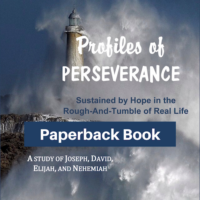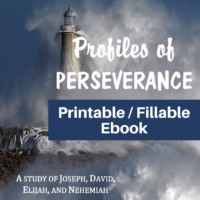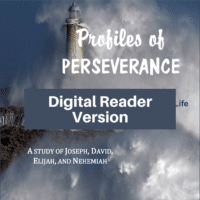David: Covered by God’s Grace as You Persevere • 2 Samuel 7, 9, &12

AI was not used to generate this post.
How do you see yourself? Do you see yourself covered in the blackness of sin, ripped at the seams by the effects sin has had on your life? There is a solution! God’s throne is a place of grace! This is post #7 in the Old Testament Men blog series. In the last article, we considered how loyalty to God and the strong support of friends help us to persevere through the trials of life. In this post, we will see how God’s grace to David helped him to pick up the pieces and move forward when he made a horrendous mistake.
Key Takeaways
- David’s humble heart demonstrated God’s grace when he invited Mephibosheth to dine at his table, showing unmerited favor.
- Despite his sins, including adultery and murder, David repented and received God’s forgiveness, illustrating the importance of a humble heart.
- God’s grace offers forgiveness and new life to believers, not based on our performance but through faith in Jesus Christ.
- The journey of faith involves perseverance, recognizing sin, and choosing to walk in the Spirit instead of the flesh.
- Ultimately, believers can confidently approach God’s throne of grace, assured that they are covered by God’s grace daily.
Listen to this post as a similar podcast from our Profiles of Perseverance Bible Study covering the lives of Joseph, David, Elijah, and Nehemiah.
David’s Humble Heart
David’s plan
After the king was settled in his palace and the Lord had given him rest from all his enemies around him, he said to Nathan the prophet, “Here I am, living in a house of cedar, while the ark of God remains in a tent.” (1 Samuel 7:1-2)
David wanted to build a “house” for God—a permanent structure, a temple to replace the vulnerable tent. Nathan thought that was a good idea.
God’s response
But God said “No” to David’s idea and sent Nathan to David with God’s better plan.
“‘The Lord declares to you that the Lord himself will establish a house for you: When your days are over and you rest with your ancestors, I will raise up your offspring to succeed you, your own flesh and blood, and I will establish his kingdom. He is the one who will build a house for my Name, and I will establish the throne of his kingdom forever. … Your house and your kingdom will endure forever before me; your throne will be established forever.’” (2 Samuel 7:11-13, 16)
Instead of letting David build a temple for Him, God told David His plan. God promised to establish David’s house and throne forever. There would always be a descendant of David who could be eligible for the throne of Israel. That was God’s grace.
Then King David went in and sat before the Lord, and he said: “Who am I, Sovereign Lord, and what is my family, that you have brought me this far? And as if this were not enough in your sight, Sovereign Lord, you have also spoken about the future of the house of your servant—and this decree, Sovereign Lord, is for a mere human! (2 Samuel 7:18-19,
David’s humble heart as God’s servant was filled with gratitude.
God fulfilled His promise to David in the rest of Israel’s history up to the birth of Jesus whose parents were both from the line of David. God is faithful and keeps His promises!
David helped another build God’s house
But there is more. God chose David’s son Solomon to build the temple. David spent time at the end of his life to prepare Solomon for the building—plans, supplies, and money. Solomon spent seven years building one of the most magnificent buildings of the ancient world.
Read the blog, “2 Chronicles 1-5 • Celebrating God’s Presence with Us” to learn more about Solomon’s building of “God’s house.”
Grace for Mephibosheth
In ancient times, the family members of a previous king were often exterminated once the new dynasty took control in order to prevent them from trying to come back into power. In this case, one heir remained from former King Saul, a man named Mephibosheth. This one person also was the son of David’s best friend Jonathan. Mephibosheth had been injured as a child and lived the rest of his life lame in both feet. Once David took the throne, he found this vulnerable man.
David’s action reveals how much he understood God’s grace to himself. He invited Mephibosheth to eat at the king’s table for the rest of his life like he was one of the king’s sons. He also gave him all of Saul’s land and assigned Saul’s servant to farm the land and bring in the crops to provide for Mephibosheth.
David’s kindness to Mephibosheth is like saying, “I want to demonstrate the same kind of GRACE (loyal love) that God has demonstrated to me.” David does not ask if anyone is deserving or qualified for this grace. He offers it unconditionally. David gives Mephibosheth an undeserved grace offering (vv. 9-10) and makes him part of his household so that he and his children would eat at the king’s table for the rest of his life!
David’s Intentional Sin
David had a humble heart. David was a man after God’s own heart. He loved God. But he was still a sinner like every human who has lived since Adam. And God hates sin.
The incident
In 2 Samuel chapter 11, you learn that David saw a young woman named Bathsheba bathing and lusted after her. Bathsheba’s grandfather was one of David’s counselors. Her father was one of David’s bodyguards. She was married to a Gentile, one of David’s royal guards, who must have adopted Israelite customs. Bathsheba likely grew up around the royal court, so familiarity plays a role in this incident. The Bible does not call this incident rape as it does in other situations (2 Samuel 13:14). Bathsheba succumbed to David’s advances. She is comfortable enough with David to send him word that she is pregnant, expecting him to do something to rescue her. So David hatches a plan with his general Joab to put Uriah on the front lines so that he would be killed, which he soon was.
We cover Bathsheba’s life in our Everyday Women, Ever-Faithful God study.
David committed adultery with another man’s wife, killed Bathsheba’s husband, and covered up the whole mess for a year.
God’s response
David knew what he had done. So did God who sent the prophet Nathan to say this to David,
Then Nathan said to David, “This is what the Lord, the God of Israel, says: ‘I anointed you king over Israel, and I delivered you from the hand of Saul. … Why did you despise the word of the Lord by doing what is evil in his eyes? You struck down Uriah the Hittite with the sword and took his wife to be your own. You killed him with the sword of the Ammonites. Now, therefore, the sword will never depart from your house, because you despised me and took the wife of Uriah the Hittite to be your own.’ (2 Samuel 12:7, 9-10,
David’s response
When finally confronted with that sin, the greatness of David surfaces in his willingness to face his sin and to return wholeheartedly to God.
Then David said to Nathan, “I have sinned against the Lord.” (2 Samuel 12:13)
David’s humble heart before God became a repentant heart. Saul, who was the king before David, always blamed others for his poor decisions. David doesn’t do that. When Nathan confronted him regarding his sin, David agreed with the Lord.
David realized what Saul never understood. God is interested in our heart attitude. What David did was evil. It was deplorable. There is no question about that. But the good news is that God responds to humble hearts willing to repent of sin and approach life God’s way instead. David wrote about this in Psalm 51.
Have mercy on me, O God, according to your unfailing love; according to your great compassion blot out my transgressions. Wash away all my iniquity and cleanse me from my sin. For I know my transgressions, and my sin is always before me. Against you, you only, have I sinned and done what is evil in your sight; so you are right in your verdict and justified when you judge. (Psalm 51:1-4)
God’s forgiveness
Because of God’s abundant grace, David was cleansed and forgiven (2 Samuel 12:13). David could persevere in his role as king, and God could still use him as a vessel for His glory.
There is no sin that is too big for God. God knows who we are without Him—helpless, dirty rotten sinners who are enemies of God. Pretty bad news, huh? That’s why God stepped in and did something about it. Romans chapter 5 says this,
BUT God demonstrates His own LOVE toward us, in that while we were yet sinners, Christ died for us. (Romans 5:8)
That is God’s amazing grace.
God’s Amazing Grace
What is grace? In particular, what is God’s grace? For Christians, “grace” is a very special word. You’ve probably heard the word but may not know what it means.Grace means “unmerited favor or undeserved gift.” God’s grace is His undeserved favor abundantly poured out on those who desperately need Him.
Ephesians chapter 2 declares this beautifully,
But because of his great love for us, God, who is rich in mercy, made us alive with Christ even when we were dead in transgressions—it is by grace you have been saved. (Ephesians 2:4-5)
God gives His grace to us because of His great love for us.
In His grace, God offers forgiveness for all our sins and gives us new life that lasts forever plus many more fabulous blessings. We receive His grace by doing one thing: putting our faith in His Son Jesus Christ. By faith alone, God’s grace is given to us. And, He does that knowing we will still sin against Him. That’s what is also so amazing about God’s grace.
Did God know that David was going to sin in a big way just a few years later? Yes! Does God know we are going to sin later today? Tomorrow? Next year? Yes, yes, and yes!
But God demonstrates His own love for us in forgiving us of those sins just because we have trusted in Jesus.
By faith, we receive God’s amazing grace—not by performance or perfection. Yet, God’s grace fosters an eagerness for doing good and gives us the freedom from the trap of sin.
Freedom from Sin’s Trap
Christians are forgiven, not perfected
Maybe you have heard the phrase, “Christians aren’t perfect—just forgiven.” That sounds trite, but it is true.
Being a Christian is not equal to being a model of perfection. It is not impossible for believers to sin. But it is stupid to deliberately do so.
The Bible says this in Romans chapter 6,
For if we have been united with him in a death like his, we will certainly also be united with him in a resurrection like his. For we know that our old self was crucified with him so that the body ruled by sin might be done away with, that we should no longer be slaves to sin— because anyone who has died has been set free from sin. (Romans 6:5-7)
When Jesus died, He released us from our bondage to sin by our faith in Him. We are free. We have died to sin’s claim on our lives. We were like prisoners who have been presented with an open door to freedom. Why would we choose to go back into the cell? Instead, we can now choose to be slaves to goodness.
The battle against sin
When we trusted Christ as Savior, our identity was changed. We are new spiritual creations. But, our sin nature still remains in our bodies somewhere. We still have that natural desire to go our own way, to sin.
Galatians chapter 5 describes it this way,
So I say, walk by the Spirit, and you will not gratify the desires of the flesh. For the flesh desires what is contrary to the Spirit, and the Spirit what is contrary to the flesh. They are in conflict with each other, so that you are not to do whatever you want. (Galatians 5:16-17)
A war is happening between our flesh (our sin nature) and the Holy Spirit living inside of us. The lure of the flesh is strong. The Holy Spirit can empower us to obey God and walk in a newness of life. But He will not force us to do it. That is a choice we make each day.
Perseverance in the battle
The Christian life is a process, not a one-time event. It takes perseverance every day to live by the Spirit and not walk by the flesh. You and I have to continually make that choice.
As believers, when we recognize sin in our lives, we can confess our sin. That just means agreeing with God that we have sinned. Then, we can repent—repentance is turning from that sin and going God’s way with our lives. Our broken heart can become a repaired heart.
Read this article to follow the biblical process for dealing with recognized sin in your life.
David chose to not hide from his sin any longer and not to blame others for it. He agreed with God about it. God forgave his sin and restored the close relationship He had with David. That did not change the consequences of his sin. But God was walking with David through those as well.
Walking with God through Sin’s Consequences
God’s mercy and love
Though David fell in his walk of faith, he got back up and went on with his life. He was able to cling to what he knew to be true about God. He held onto God’s sovereignty, God’s mercy, and God’s love for us even during times of discipline.
Sin did not change David’s relationship as a follower and worshiper of God. It didn’t affect God’s love for David.
For us as Christians, sin cannot change our identity or position in Christ. It cannot change our eternal destiny. Those things are done deals from the moment of our salvation.
Consequences happen
Sin can influence how our lives look today. In other words, you are forgiven completely, but there are sometimes consequences to sin. Sometimes we make a mess of our lives by our foolish choices and decisions. In that case, we can usually recognize the natural consequences of our sin that produce pain in our lives. You can choose your sin, but you can’t choose your consequences. Yet, God’s grace often prevents the full weight of the consequences from happening.
Dealing with consequences
Our study of David shows how sin can distort even the best of people. But it also shows how the best of humans can deal with sin in repentance and confession. David is a testimony to us of God’s love and His goodness. God’s marvelous grace touched David. He was a man with a humble heart, then a man with a brave heart, then a man with a broken heart and then a man with a repaired heart.
Seeing Yourself Covered by God’s Grace
How do you see yourself? Do you see yourself covered in the blackness of sin, ripped at the seams by the effects sin has had on your life? There is a solution! God’s throne is a place of grace!
For we do not have a high priest who is unable to empathize with our weaknesses, but we have one who has been tempted in every way, just as we are—yet he did not sin. Let us then approach God’s throne of grace with confidence, so that we may receive mercy and find grace to help us in our time of need. (Hebrews 4:15-16)
The Bible promises that because of Jesus’ shed blood on the cross, we can draw near with confidence to the throne of grace, so that we may receive mercy and find help in our time of need.
If you have never placed your faith and trust in Jesus, you can do so today. Please consider praying this prayer:
Thank you, God, for loving me and for sending Your Son Jesus to die for my sins. I trust in Jesus Christ to be my personal Savior and turn my entire life over to You. Amen.
If you did that, tell someone.
As soon as you trust in Christ to be your Savior, you begin a loving relationship with Him. He will remove the cloak of sin from you—all sins—past, present and future.
If you are already a believer, see yourself as God sees you. You are His child, totally loved by God, one of God’s saints, who sometimes sins.
God’s grace is His undeserved favor abundantly poured out on those who desperately need him. His grace overflows to you every single day. You are completely forgiven and covered in God’s grace. God gives His favor to someone not because they are good enough to deserve it but because His love chooses to do so. We all receive it when we trust in Jesus. Isn’t being covered by God’s grace amazing?!
Are You Ready for Perseverance in Your Life?
As the Bible promises,
For whatever was written in earlier times was written for our instruction, that through perseverance and the encouragement of the Scriptures we might have hope. (Romans 15:4 NASB)
We can have hope because we have God with us. So, remember our lane markers for the race.
- Choose to persevere through every challenge.
- Count on God’s promise to give you hope.
- Let that hope sustain you through the rough-and-tumble of life.
- Celebrate the joyful reward.

Let Jesus satisfy your heart with hope as you persevere through everyday life.
Read all the articles in our Old Testament Men series. In the next post, we will learn from Elijah’s life that our God is a God you can really know.
All of the above information is covered in the Profiles of Perseverance Bible Study covering the lives of Joseph, David, Elijah, and Nehemiah.
AI was not used to generate this post.


